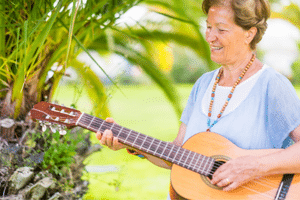
So you always wanted to give the guitar a try, but you never had the time in your busy schedule, or maybe you’re entertaining it as an exciting new idea in your golden years. Either way, this article reveals everything you need to know and consider about learning guitar for seniors.
Would it surprise you to learn that I have been playing and teaching guitar for over 50 years? One of my best students was 83 years young! If you were interested enough to find this article, go a little further and continue reading to see how I can help you get up and running with the guitar.
You can use the table of contents below to take you to the area that interests you. Click on the little box to open it and then click on the section of the article you want to read, or you can read from start to finish if you want the full “seniors are awesome” experience!

Is Learning The Guitar As A Senior Legit?
Absolutely! More seniors than ever are learning to play an instrument, especially the guitar. If you are considering the possibility, then “just go for it!” There’s no need to second guess yourself.
It’s not a matter of how much talent you have. Remember, you’re retired or moving toward it. You most likely want to play for your enjoyment, not earn a living.
My mother, who thought she could do anything (and she could!), decided to learn to play the guitar at 65 years old. She played, sang, and entertained her family and friends for years while having the time of her life doing it!
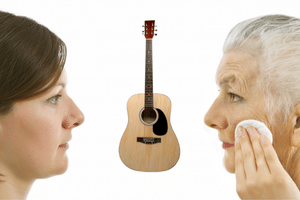
What Age Is Too Old To Learn Guitar?
The answer is that it’s never too late to learn to play the guitar or any other instrument. It is simply a matter of desire, commitment, and putting your plan into action!
If you’re facing some physical challenges like arthritis, difficulty seeing or hearing, or memory problems, rest assured that there are ways to work around your problem and get enjoyment from playing the guitar.
The key is to have an innovative and positive approach and find the best learning method for you. There’s no reason you can’t succeed, no matter how old you are!
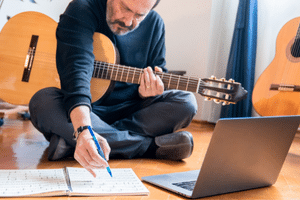
What Is The Best Way For An Older Person To Learn Guitar?
Everyone learns a little differently but here are some tips that will help you on your way to being a successful guitar player.
Be patient
As we all know, “patience is a virtue,” and it really pays off at any age when it comes to learning how to play any instrument well. Don’t try to learn too much too fast. It’s not a race, so keep it enjoyable and satisfying by taking things a little at a time.
If you expect too much too soon, you will get discouraged and be more likely to give up. Remember, the idea is to make it a positive experience that will add joy to your life.
Find What Works Best For You And Stick With It
This is one of the first things you should do as you begin your guitar journey. How do you learn best? Are you someone who feels more comfortable learning in a structured environment, or are you better off learning on your own?
There are so many educational resources for learning to play the guitar.
- Learning by ear
- Learning from a family member or friend
- Private instruction
- Group seminars
- YouTube videos
- Online computer programs
Start Slow And Work Your Way Up

When learning to play the guitar, it’s always best to start slow. Begin with just 5 minutes a day and work your way up in 15-minute increments. If you build up to an hour, feel free to break that up into 15 or 30-minute sessions.
It’s always ok to take a break and come back to do some more later that day. Most people absorb more and learn faster that way.
Build Calluses On Your Fingers
When you first begin to play the guitar you might find it a little uncomfortable to press down the strings on the neck of the guitar. This is because you have to build up calluses on your fingertips. This will happen naturally as you continue to play.
Eventually, it will feel very comfortable when your calluses are fully formed. Stop playing immediately if your fingers get sore. As you age, your skin becomes thinner so take it slow and easy. For more info, see Fingertips Hurt Playing Guitar? – How To Stop The Pain!
Start With Easy Songs
As you begin to play the guitar, it’s essential to develop your basic skills like getting your hand-eye coordination together and perfecting the movements for each hand individually.
No matter what learning method you use, start with playing simple things. If you use a guitar method, begin with the first book in the series. If you are learning by ear, start with simple melodies and chords, advancing slowly.
It’s ok to challenge yourself but always return to your comfort zone and progress slowly from there.
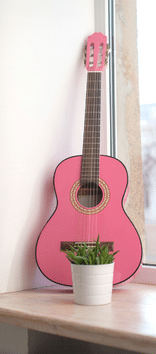
Get A Decent Guitar And Keep It Handy
Beginners often make the mistake of starting on a guitar that would be difficult to play for even an advanced player. You don’t have to spend a lot of money to get a decent guitar.
It’s a good idea to have a family member or friend that plays guitar help you pick out your first instrument. If possible, try before you buy, but remember that any guitar will be awkward to play when you first begin.
Keep your guitar handy and preferably where you will see it. This will make you more apt to play it. I recommend that you keep it in the room your frequent most and on a guitar stand so you can just reach over and pick it up.
The family room is a good bet so that you can practice while you watch a little bit of TV.
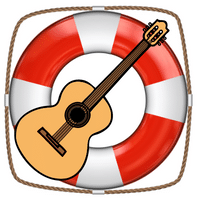
Don’t Be Afraid To Ask For Help!
Never be afraid to ask for assistance if you have questions or need help. There are plenty of guitar resources you can take advantage of.
Family members and friends who play guitar or other instruments are good starting points. Perhaps there is a local organization or club where like-minded individuals get together to discuss or play music.
You can consult instructional materials or reference guides available at your local library or online. Online resources can include guitar-playing forums and “how-to” videos.
There are plenty of music stores where you can take adult guitar lessons or begin online guitar lessons for adults.
The possibilities are almost unlimited. If people see that you are enthusiastic and motivated, they will be happy to assist you.
Before you know it, you will be giving back by helping others in need.
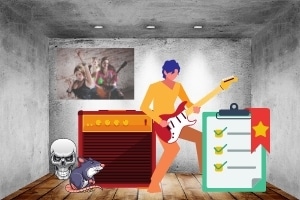
Practice Guidelines & Checklist
Here are some general guidelines to get you started on your new pastime as a guitar player. Enjoy! ??
Follow A Practice Schedule
For consistent progress, it’s good to organize your playing schedule to make the most of your time. It’s also important not to “over-organize!” You’re doing this for fun, remember?
Split your schedule into blocks of time. Let’s say you have worked your up to one hour a day. For example, you could break your practice time into four blocks (it doesn’t have to be right to the minute).
- Block 1 – 15 Minutes: Practice a song from sheet music
- Block 2 – 15 Minutes: Work on a guitar technique (hammer-ons, trills, or anything else)
Intermission! – You deserve it ?
- Block 3 – 15 Minutes: Basic ear training techniques (find a song’s key signature on your guitar)
- Block 4 – 15 Minutes: “Noodle around” on your guitar to discover fun melodies or “licks,” etc
Give yourself a hand for a job well done!?
Choose The Best Time To Play

Get in the habit of practicing at approximately the same time each day. This helps you put aside “me-time” so that you won’t have to scramble to fit it in at the last minute.
I get up early in the morning before anyone else to have minimal interruptions, but you should select the time that works best for you. It’s ok to be flexible if that suits your lifestyle best.
Develop Good Playing Posture
Good playing posture helps you play properly and can prevent aches and pains, especially as you get older. Sit in a comfortable chair that keeps your chest at approximately a right angle to your thighs. Both feet should touch the floor. Don’t slouch but make yourself comfortable.
Practicing in an “armless” chair with a nicely cushioned seat or a couch are good choices.
Stay Relaxed
It’s essential to stay relaxed during your practice or performance sessions. This will allow you to play your best and get the most joy from the guitar. Many people use their guitar as part of a relaxation technique to control their anxiety.
Fix your favorite beverage or a little snack that your can have while you practice or surround yourself with photos of your loved ones, whatever helps you relax.
Never bring performance anxiety into your session. It is not a test, so no one is grading your performance!
Tune Your Guitar!
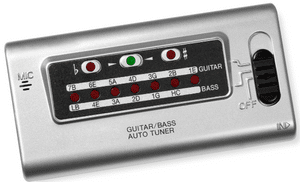
The very first thing to do each time you pick up your guitar is to tune it!
You never want to play the guitar that isn’t properly tuned because it’s counterproductive to developing your musical ear and your enjoyment of the sound of your music.
It doesn’t take much to put your guitar out of tune; even changes in room temperature can do it.
You can buy a cheap digital guitar tuner or use a free online tuner. Eventually, you may learn how to tune it accurately “by ear.”
Always Use A Metronome
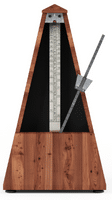
Get in the habit of using a metronome whenever you play. This will help you develop good timing and make your music sound professional. The best metronome, especially for beginning players, is to tap your foot as your play to help you “keep time” with the music.
This metronome goes wherever you and your guitar do. You will see some of the world’s best guitar players tap their foot when they play!
You can also buy a digit or mechanical (classic) metronome or use a free online metronome. Use whatever works best for you. I mostly tap my foot or use my digital metronome if I am learning a difficult or very fast passage.
Start Slow And Build Up Speed
Always start slow, with your metronome set to a tempo (speed) that is comfortable for you to play without making mistakes in the music or experiencing discomfort in your fingers, hands. and wrists. It’s not a race to the finish line!
Slowly build up speed until you can play the musical piece up to tempo (“on time”). Even the simplest song sounds great when it is played correctly.
Memorize When Necessary
Don’t be afraid to memorize basic concepts that you can use as building blocks to improve your playing. You shouldn’t try to learn too much at one time.
Break things up into small chunks and pace yourself. There’s not really too much you need to remember to get yourself started with the guitar.
The minimum you should learn is the names of a few basic chords and how to play them, which is all you need to play the guitar to accompany yourself while you sing.
As you continue to progress, you may want to learn more, depending on your particular needs.
For more info, see How To Stay Motivated To Learn Guitar – Top Tips For Success

Overcoming Handicaps
As we continue to age, we develop problems that can make it challenging to participate in our daily living activities and do the things we enjoy.
Here are some common problems I see in older adults that can make it difficult to play the guitar, along with some suggestions for ways you can work around them.
Eyesight Problems
If you have a problem seeing the neck or strings on your guitar, you may need glasses or a change in the strength of your lenses. It’s a good idea to see an eye doctor to ensure you are not having a serious problem with your eyes.
If you are having difficulty reading sheet music consider getting a hands-free magnifier that can be worn like a pair of eyeglasses. To watch instructional videos on a computer screen or tablet you can use a video magnifier.
Your local eyesight association may be able to offer you ideas for the best solution and equipment at a discounted price.

Arthritis
Arthritis is a common problem in older adults that can make it painful to play the guitar, especially if it affects the joints in your fingers, hands, or wrists.
The first thing I recommend you do is to check with your doctor to see if there is a medication you can safely take to improve your symptoms. Plan on playing for short time periods, particularly when first learning. Stop playing immediately if you develop arthritic pain.
Get a guitar that is easy to press down on the strings without putting too much pressure on your fingers. Electric guitars with thin strings and low action or nylon-string acoustic guitars are usually the easiest to play. Consider taking the guitar to a music store to adjust it to your particular needs.
If you have trouble sitting, find a chair with cushioning that does not hurt your back or hips. Take frequent breaks from your playing to get up and move around.
For more info, see Playing Guitar With Arthritis: Overcoming Your Hand Problems.
Hearing Problems
Hearing problems such as difficulty understanding words or music and ringing in the ears (tinnitus) can make it difficult to play the guitar effectively.
Have your hearing checked by a healthcare professional. It may be something as simple as removing wax from your ears! A hearing aid can often allow you to fully enjoy the sound of what you are playing on your guitar.
Sometimes, playing an electric guitar will give you the volume you need to hear the notes clearly. Avoid turning the guitar amplifier up too loud. Exposure to very loud sounds can eventually worsen the hearing loss and ringing in your ears!
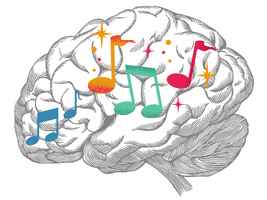
Memory Problems
Having a memory problem won’t prevent you from playing the guitar, but it can make things difficult. Here are some things you can do to improve your ability to play the guitar effectively.
Get plenty of rest. Sleep deprivation can make memory problems worse. Try to control your anxiety. If you forget something while playing your guitar, don’t get alarmed or upset, it’s no big deal. Move onto something else or take a break from playing.
Keep a notebook to write things down that you can refer to if you forget or get stuck while practicing. You can also write notes on your instructional guitar book or sheet music.
Always be sure to alert your doctor to ensure that you get the testing and treatment you need and that your medication is not making your memory problem worse. Your doctor may also recommend an over-the-counter supplement that may help you.

Sing-Along With Your Playing
One of the best things you can do to improve your playing and make it sound more professional is to sing along with the music. You might find it difficult at first as a beginning guitar player
If you enjoy singing, that’s probably one of the reasons you are attracted to playing the guitar, which is an excellent accompanying instrument.
Songs that don’t have words might need a few. If you come up with a melody, don’t be afraid to add some lyrics. It’s all part of the fun of being a musician!
Atmosphere Is Key! Play In Your Special Space
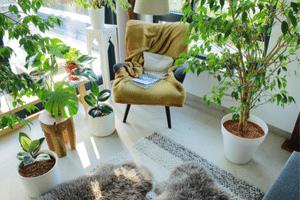
Choose a spot to practice your guitar that makes you happy, relaxes you, and gives you privacy. It doesn’t have to be an elaborate or spacious setup.
Maybe a sunny corner of the house with a nice view or a comfortable chair next to your favorite plant.
This will become your little musical sanctum, and you will look forward to visiting it each day to play some music!
After a while, your guitar collection may have grown to the point where you may need a bigger space. Consider converting a room into your private music studio. This will allow you to display your guitars and make them easier to access.
I keep all my guitars out on stands, so I can play a different one each day by just grabbing it. My studio also allows me to organize my guitar amplifiers and effects boxes. I have an area where I built a digital recording studio. I can make CDs or instructional videos.
The best approach is to use whatever works best for you. You can always change it or expand it as you continue to improve as a guitar player.
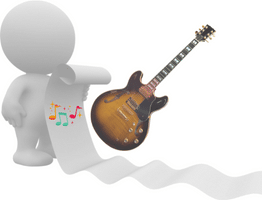
Work From A Song List
As you continue to learn songs, they turn into your musical repertoire. Play them often, so they become “second nature,” and you can easily play them on request.
Eventually, you’ll have a song for every occasion! Some guitar players organize their songs in notebooks, like Christmas songs, folk songs, party songs, etc.
Your playing will become a hit with your family and friends before you know it!

To Read Or Not To Read (Sheet Music)?
Many people avoid playing an instrument later on in life because of an experience they had trying to read music when they were younger.
Does this sound familiar? Maybe you were trying out for the high school band, or your parents made you take piano lessons, and you hated it.
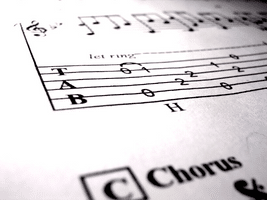
Don’t stop reading; things are different today! Guitar music comes written in “tablature” (TAB).
Tablature makes it simple to read music because it shows you where to put your fingers on each fret as you play the song!
It’s like a blueprint for how to play the song on your guitar without suffering through years of learning how to read standard musical notation!
Playing from TAB (or standard musical notation) is one of the fastest and easiest ways to learn songs, so don’t let the idea of having to read written music stop you from giving the guitar a try!
You can read sheet music online or get it printed out on paper. If you like reading it the old-fashion way, do yourself a favor and get a music stand so that you can adjust it to a height and angle that is most comfortable for you!
For more info, see Best Guitar TAB Sites – What No One Is Talking About!

Embrace Ear Training
Ear training is one of the best things you can do to improve your ability to play by ear (without written music). Even if you plan to play from sheet music only, ear training will make that a lot easier.
Ear training can be as simple as just picking out a tune on the guitar that you hear in your head.
Don’t be afraid to make mistakes; it’s all part of the learning process.
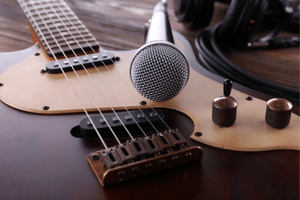
Record Yourself
Have you ever listened to a recording of yourself speaking? It’s not the way you would think your voice sounds to others.
This is because most of the sound waves from your voice go directly into the microphone instead of bouncing off things around you and then into your ears.
It’s much the same way with playing the guitar. The acoustic tone of your instrument can sound different on a recorded playback.
Listening to an audio recording gives you feedback about your overall tone, tempo (locking in on the timing of the melody and rhythm), and picking dynamics (too loud or soft).
Watching a video recording tells you about your playing posture and fretting & picking (strumming) hand movement & mechanics. Are you relaxed or tightening up when you play?
You would be amazed how many instructional pointers you can pick up by listening (audio) and watching (video) yourself play!
If you don’t have a smartphone to record yourself, give that old tape recorder hanging around the house just collecting dust a try. You’ll be glad you did!

Advantages Of Learning To Play Later On In Life
Even if you tried to play the guitar earlier on in life and couldn’t make a go of it, chances are you have advantages now that will help you succeed as a musician.
- You don’t have to work, or you work part-time
- Your family is raised and not dependent on you
- You have more leisure time to do the things you enjoy
- You are more mature and disciplined than you used to be
- You are more financially secure and have extra money put aside to buy a guitar
Any combination of these advantages can help you to achieve your musical goals.
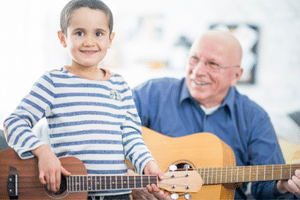
The Senior Privilege – More Time For Hobbies!
Many seniors find themselves with extra time, and some have more time than they know what to do with. There’s nothing like adding a little extra fun to your day by learning how to play the songs you love!
Even if you already have a hobby or two, how about shuffling things around a little? There’s always room for a bit of music! It’s a great way to fill in that extra 15 minutes of unanticipated time.

Maturity And Discipline Matter!
As we get older, we become more mature. Eventually, we do less when we retire, but we have accumulated a vast amount of wisdom and discipline throughout the years.
These skills and life experience can be a tremendous advantage for learning how to play the guitar or any other instrument.
Musical accomplishment requires a mix of creativity and structure. Your age helps give you this advantage, so use it with pride!

Music Reduces Stress And Makes You Happy!
Playing music has been shown to help reduce stress and make people generally happier and more fulfilled. Some people say it even improves an episode of depression.
Older adults can be particularly prone to stress and anxiety. Music is good medicine for whatever ails you!
Make it a habit to play your guitar every day. If you are more stressed than usual, play songs that you find relaxing or uplifting, and sing along, if possible.

Don’t Let Self-Doubt Stop You!
If you want to learn to play the guitar, then don’t second-guess your ability to do so! Over-thinking the situation isn’t the way to go.
Sometimes, one of the most difficult things to do is take that first big step!
Your best bet is to get yourself a guitar and start having fun. Take my word on this and, you’ll be glad you did!

Beware Of Naysayers!
Some of the most successful people in the world have worked their magic despite those who said it just wouldn’t work!
Having confidence in your ability to succeed is all you need to get yourself started!
Never let the argument that you are an older adult get in the way of your musical aspirations. It’s ridiculous even to think that way!

Frequently Asked Questions
Here are some of the questions I get asked most often by older adults about learning to play the guitar.
These answers are general guidelines since they will be a little different for each student.
How Long Does It Take To Learn The Guitar?
The short answer is that it mostly depends on your motivation and willingness to practice consistently, which is more important for beginners than raw talent.
The average beginner can learn all the basic skills required to play simple songs in just one to six weeks.
How Many Hours Should You Practice Guitar A Day?
When you first begin to play, start with 5 minutes and increase by ten or 15-minute intervals as you see fit. It’s important not to overdo it and take breaks if you play for more extended periods.
Stop immediately if you experience any physical discomfort.
It’s easy to get discouraged and give up if you try to do too much too soon, so don’t fall into this trap!

Can I Teach Myself Guitar?
Yes, many people do. I began as a self-taught player and added some music theory classes here and there as I continued to improve.
Some of the most famous guitar players were self-taught, including Robert Johnson, Wes Montgomery, and Jimi Hendrix.
With all the interactive and video-based educational materials, it’s easier than ever to teach yourself how to play the guitar.
What Should You Learn First On Guitar?
First, make sure you know how to properly tune your guitar, then learn the names of the six strings.
Next, learn the names of the notes in the first three frets on each string.
Play simple melodies and chords using the open strings and the first three frets.
Which Guitar Chords Should I Learn First?

It’s best to start with simple chords played on the open strings and in the first three frets.
A, C, D, E, and G are good chords to learn first.
You can play quite a few songs with just these chords.
You can learn other simple major, minor, and dominant chords as you progress as a player.
What Guitar Is The Best For A Beginner?
Guitars for adults follow the same principles as guitars for young beginners. Here’s what to look for in a guitar that’s easy to play.
- Strings – The strings should be close enough to the fretboard to press down comfortably. Strings that are too thick are also difficult to play.
- Neck – Look for a guitar with a neck that is on the smaller side, unless you have very large hands.
- Style – Get a guitar that motivates you to play. If it looks good and has a pleasing tone you are more likely to want to pick it up and practice.
Is It Better To Start With Acoustic Or Electric Guitar?
Electric guitars tend to be easier for beginners to play than acoustic guitars, but if acoustic is your thing, then that’s what you should go with.
Playing an electric guitar does not mean you need to get an amplifier right away. I play my electric guitars unplugged more often than not, especially during short practice sessions.

Can You Be Too Old To Play An Electric Guitar?
You can never be too old to play an electric guitar! Just because you didn’t start playing one when you were much younger doesn’t mean you’ve lost the opportunity.
The electric guitar will open up a whole wonderful world of options, like amplifiers and effects boxes. Playing electric music doesn’t necessarily mean you have to play loud.
If that’s the kind of guitar you want to play, don’t let anyone or anything get in your way. Who knows, you could be the next Buddy Guy or Sister Rosetta Tharpe!

Final Thoughts
Learning guitar for seniors can have its own set of challenges, depending on your particular situation. Problems with arthritis, eyesight, hearing, and memory can require a more creative or adaptive approach.
Never let your age interfere with your desire to play and enjoy the music! Always focus on the benefits of being an older adult and use these things to your advantage.
The best guitar for adult beginners will vary according to your particular needs but always choose an easy instrument to play.
Find the learning system that works best for you and stick with it. It’s essential to create a practice schedule that keeps you focused but allows you to progress at your own pace.
Sing along with your playing whenever possible to lift your spirits and give your practice more meaning.
Create your special practice place, like the corner of a room with a nice view that relaxes you and gives you the privacy you need to practice and learn.
Seek assistance or help from others whenever needed, especially when getting started.
Always ignore naysayers! You know what you would like to accomplish in life, so have faith in your ability and make it happen!
If you were “on the fence” about getting started with the guitar, I hope this article gave you the information you need to get you on your way!
Related Article ➡ 20 Guitar Tips For Beginners That You Must Know!
Related Article ➡ Is Playing A Guitar A Talent Or Skill? – Secrets To Success!
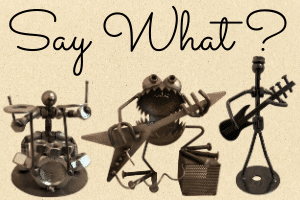
Tell Me What You Think
Please leave a comment below if you enjoyed this article, have any questions about learning guitar for seniors, or want to give your point of view. I will be happy to help you.
- If you have been thinking about learning to play the guitar as an older adult, what’s stopping you?
- After reading this article do you feel more confident with your ability to succeed as a guitar player?
- Have you bought a guitar? If so, did you buy an acoustic or an electric guitar and why?
- Did you learn something that will be especially useful to help you become a better guitar player? What?




The only thing stopping me from learning the guitar is time. I’m working on being able to work less over time so that I can. I already record music and make my own productions, so the advice to record yourself is great for a beginner of any instrument or vocals.
I like the motivational points you made about not listening to others’ negativity and doing what your heart desires. (obviously paraphrasing) The whole reason I first started making music was to get rich but the more I actually learned about it and how to create it It became a zen-like stress-relieving process. Now, It’s my go-to when I need to let off some steam or I’m just feeling creative.
My son-in-law plays guitar, so I have access to them and an amp. I’ve always liked the bass a little more. Would it be wise to learn the guitar first or do you know if it would be easier for me to start with a bass first? Thanks for the informative inspiration.
Hi, T-Rx
Thank You for your comments!
If you are already involved with recording music, you obviously have an aptitude in that direction. You can use this as a great starting point for playing the guitar (or bass guitar).
That’s a great idea, to borrow a guitar from your son-in-law, and I recommend you ask him to have to give you a few lessons. It doesn’t really matter if you begin on guitar or bass guitar. They have four strings ( E, A, D, & G) in common, so whatever you learn on one instrument is totally transferable to the other!
If you favor the bass guitar, then I would definitely start there. You may end up playing both, but the bass is totally legit! The more into the instrument you are, the quicker you will learn.
Time investment does not have to be an issue with beginning players. All you need to make steady progress is 15 minutes a day.
There’s no better “zen-like stress-relieving process” than playing a musical instrument if you approach it correctly! Play to relax and have fun, not make money, and the stress factor melts away.
I can see from your comments that you have a genuine interest in playing bass and/or guitar, so don’t overthink it, jump in and never look back! 😊🎸
Frank
I simply cannot express how wonderful I think this article is. Although I am not Over the hill yet, I can only Hope I will be fortunate enough to have the time in my retirement to learn hobbies I didn’t get around to during my formative years. Jeez, it would simply be a blessing just to make it to retirement at this point! I have watched my grandparents in thereRetirement years and have seen how much they enjoy their activities. Mostly, seems they are busier than I am most of the time with their bridge teams andPottery classes.I envy them at this point. I will definitely be sharing this article with them, however.I think music, especially learning to play music, has some distressing properties that are unmatchedIn many other senior hobbies.That is quite impressive how long you’ve been playing guitar and teaching. Is there a place we can find any recordings of your music? A YouTube channel or the like? I would love to show them!
Hi, Ashley
Thank You for your comments!
You don’t have to wait until you get old enough to retire to learn to play an instrument. Maybe this article will inspire you to get yourself a guitar and have some fun learning the music you enjoy most! Then you can teach your grandparents how to play. 😊
You can’t imagine how gratifying it is to be a musician.
I don’t currently have any recorded material online but I will be adding some to my website in the near future.
Frank
Great article, encouraging to us older, just retired folks. Please add a music stand to things new guitar players need. My visiting son saw I was trying to read music off the dining table while holding my guitar. When he went home, he shipped me a folding music stand. Why didn’t I think of that? What a difference it has made!
Hi, Kary
Thank You for your comments!
You are absolutely correct! I read my sheet music online and mistakenly assumed that everybody else does, too. However, I have added information about the importance of using a music stand to the article. Thank You for calling this to my attention! Sometimes it’s easy to miss things along the way. Please let me know if you find any other problems on my website, and I will be glad to correct them.
I sincerely hope this article was of use to you. No matter how old we get, we can always enjoy music!
Keep On Playing! ?
Frank ?